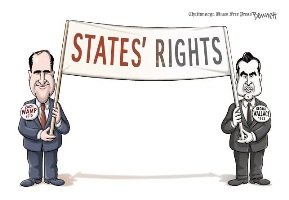Cards In This Set
| Front | Back |
 1st Amendment |
Freedom of religion, speech, press, assembly, and petition
|
 2nd Amendment |
Each state can maintain an armed forcce for its own protection. Right to bear arms
|
 3rd Amendment |
Soldiers will not be quartered in a house without consent of the owner in a time of peace.
|
 4th Amendment |
Police officers mst have a warrant on reasonable grounds in order to earch or seize evidence or people
|
 5th Amendment |
No person can be tried for a federal crime if they have not been indicted by a grand jury.
No person can be tried twice for the same crime
No person can be a witness agianst himself
Cannot be deprived of life, liberty, or property without due process of law
|
 6th Amendment |
Right to a speedy trial by an impartial jury
Defendant must be informed of the charge upon which he is tried
Can have a witness to testify for him, and an attorney
|
 7th Amendment |
Right to a trial by jury in a civil case in a federal court if the amount of money involved exceeds $20
Right may be waived if both parties agree to a bench trial
|
 8th Amendment |
No excessive bail or fines
No cruel or unusual punishment
|
 9th Amendment |
Along with the civil rights guaranteed by the Constitution, there are other rights held by the people
|
 10th Amendment |
All powers that are not granted to the national government, but are not forbidden to the states, belong either to the states or to the people of each state
|
|
11th Amendment
|
Repealed part of Article III, Section 2, Clause 1. No state can be sued in a federal court by a resident of another state or a foreign country.
Cannot be sued by one of its own residents
|
|
12th Amendment
|
Replaced Article II, Section 1, Clause 3. Separated the balloting for President and Vice president
Vice president must meet the same qualifications as the president
|
|
13th Amendment
|
Forbids slavery in the U.S. and in any area under its control.
forbids other forms of forced labor, except as punishment for crimes
|
|
14th Amendment
|
Defines citizenship: citizenship at birth is determined according to the "soil" wehre born or the parents to whom born
Naturalization can be acquired after birth
Due Process Clause forbids a State to act in an unfair way
Equal Protection Clause forbids a state to discriminate against persons
|
|
15th Amendment
|
Forbids states from denying the right to vote to any person on the grounds of race, color, or previous condition of slavery
|



